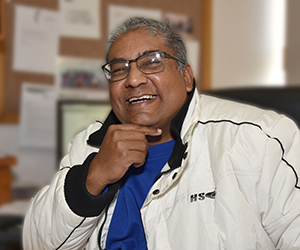Latest News Archive
Please select Category, Year, and then Month to display items
11 September 2024
|
Story Anthony Mthembu
|
Photo Anthony Mthembu and Chelsea Carolus
 From the left: Geraldine Lengau, Senior Officer in the Unit for Institutional Change at the UFS; and Oratile Reina, West College Prime.
From the left: Geraldine Lengau, Senior Officer in the Unit for Institutional Change at the UFS; and Oratile Reina, West College Prime.
As part of the initiatives lined up for College Week, the student leaders of West College at the University of the Free State (UFS) hosted a dialogue that primarily focused on discussing social justice as a value of Vision 130. The dialogue was held at Outeniqua Residence on 3 September 2024 and was well attended by students within West College.
According to Oratile Reina, West College Prime, “the motivation for the dialogue was to prepare newly elected leaders and our college community to align their efforts with Vision 130 – a vision that aims to create a more inclusive, equitable, and socially just environment on campus”. As such, she highlights that the dialogue was an opportunity for leaders to discuss practical strategies for implementing these values in their respective spaces, and to encourage those in West College to become better citizens inside and outside the university.
A conversation on social justice
The dialogue was facilitated by Geraldine Lengau, Senior Officer in the Unit for Institutional Change and Social Justice at the UFS. Lengau touched on several aspects pertaining to the topic of discussion. Firstly, she allowed the audience to give their definition of social justice, especially as students within the institution. In addition, she went on to talk to the audience about sexual assault in the context of social justice. In this instance, Lengau gauged whether the students knew which processes to follow in the event of a sexual assault incident, and whether they were acquainted with the UFS Sexual Harassment, Sexual Misconduct, and Sexual Violence Policy. Furthermore, the audience was given the opportunity to outline what social justice looks like to them in the spaces they occupy, including in their respective faculties, the sports they play, and the leadership structures they form part of. “I was encouraged to see that students take their right to a socially just university in very high regard, and that they were willing to break it down from what Vision 130 proposes, in order to align it with their common understanding,” said Lengau.
As the dialogue concluded, the audience signed a pledge committing to uphold the values of Vision 130. According to Reina, “The pledge represents a promise to take concrete steps towards fostering an inclusive and equitable campus culture. By signing the pledge, the leaders are not only agreeing to embody these principles in their leadership roles but are also holding themselves accountable to their peers and the broader university community.”
UFS Professor on his new book on Boko Haram
2017-02-01

Prof Hussein Solomon, Senior Professor
in the Department of Political Studies and
Governance at the UFS and co-editor of the
book titled Understanding Boko Haram:
Terrorism and Insurgency in Africa.
Photo: Charl Devenish
Understanding the nature of the Boko Haram insurgency in northeast Nigeria is exactly what Prof Hussein Solomon from the Department of Political Studies and Governance at the University of the Free State (UFS) has set out to do.
Understanding the emergence of Boko Haram
Prof Solomon says tens of thousands of people have been killed in northeast Nigeria and neighbouring states as a result of the violence unleashed by the terrorist group. With the help of his co-editor, Prof Jim Hentz, who is an army colonel and lecturer at the Virginia Military Institute in the US, they set out to “understand the emergence of Boko Haram in a historical, sociological, economic and political context”.
In his book, titled Understanding Boko Haram: Terrorism and Insurgency in Africa, Prof Solomon “seeks to understand the emergence of Boko Haram in a historical, sociological, economic and political context”.
Book launch to take place in Chicago in the US
In his previous book, Islamic State and the Coming Global Confrontation, he analyses the origins and organisational structure of the Islamic State. Although an entirely new topic, but within the broad theme of political Islam, this book focuses more on how Boko Haram has become part of the Islamic State’s franchise in West Africa.
The book, which took more than a year to write, is based on secondary research, followed by primary documents and interviews done on the ground in Nigeria. It will be of much interest to students of terrorism and political violence, insurgencies, African politics, war and conflict studies, and international relations in general.
The official launch will take place at the African Studies Association’s annual meeting and takes place from 16-18 November 2017, in Chicago in the US.